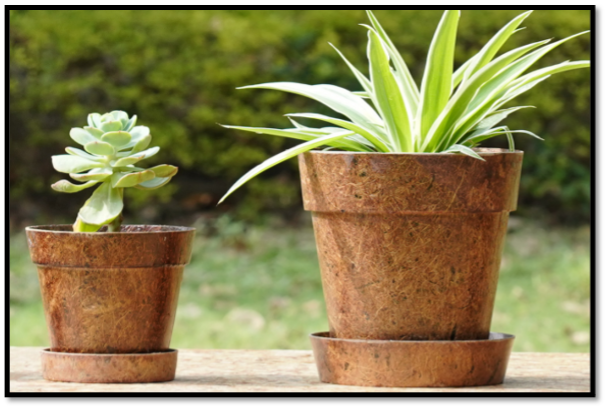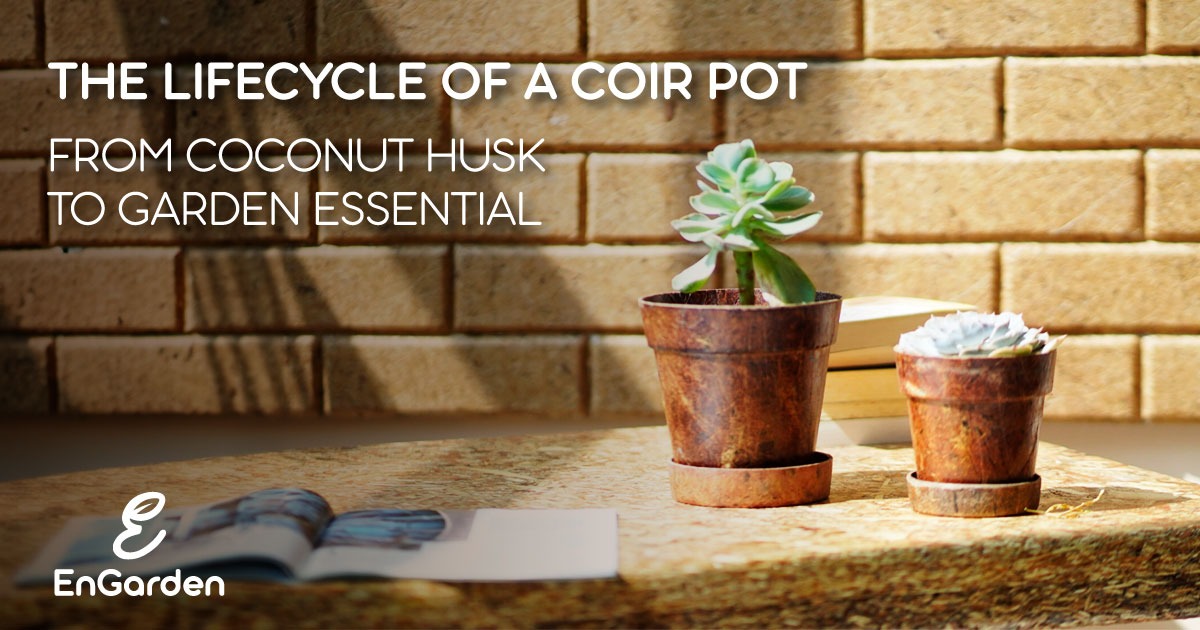Sustainability today is no longer a choice—it is essential for our survival. One simple yet powerful example is the lifecycle of coir pots. These eco-friendly containers transform discarded coconut husks into biodegradable, plant-friendly pots that reduce waste and promote greener living. In this article, we’ll explore how coir pots are made, their benefits for plants, and why they are a smart choice for sustainable gardening.

Origins of Coir
The story of coir begins in Kerala, India, often called the land of coconuts. The word “Kera” itself means coconut tree in Malayalam.
In the 1800s, the first coir industries appeared in Alleppey, where people turned abundant coconut husks into valuable fiber. Since then, the coir industry has spread across Tamil Nadu, Karnataka, and other states, creating jobs and supporting rural economies.
What is Coir?
Coir is the fibrous material found between a coconut’s hard shell and outer husk. It comes in two forms:
- Brown Coir – From mature coconuts; strong and durable, ideal for pots.
- White Coir – From immature coconuts; soft and elastic, used for ropes and mats.
Instead of being discarded as waste, coconut husks become a renewable and sustainable resource through coir.
The Lifecycle of Coir Pots: How They Are Made
The production process of coir pots combines traditional practices with modern methods:
- Harvesting & Retting – Farmers collect coconut husks and soak them in water for a few weeks to loosen the fibers.
- Fiber Extraction – Workers separate, clean, and sun-dry the fibers before grading them for quality.
- Shaping & Molding – Manufacturers compress the dried fibers into molds. They sometimes use natural binders such as starch or latex for added strength.
- Drying & Packaging – The pots dry naturally in the sun and are packed in eco-friendly materials for shipping.
Through these steps, coir pots become durable, biodegradable, and safe for plants.
Lifecycle Benefits of Coir Pots for Plant Growth
Unlike plastic or ceramic pots, coir pots allow roots to breathe. Because they are porous, they help plants thrive by:
- Improving root health and nutrient absorption
- Preventing soil compaction
- Retaining water for longer periods
- Supporting beneficial microbes in the soil
As a result, gardeners enjoy both healthier plants and a natural, rustic look in their gardens.
Sustainability Benefits of Coir Pots
Switching to coir pots provides environmental and social advantages:
- Biodegradable – Coir pots decompose naturally, unlike plastic.
- Zero Waste – Used pots enrich the soil instead of creating landfill problems.
- Soil Friendly – They improve aeration, water retention, and weed control.
- Community Support – The coir industry sustains rural livelihoods.
- Eco-Certification – Coir products contribute to LEED green building points.
Therefore, choosing coir pots directly helps reduce plastic waste while encouraging eco-friendly gardening.
Coir Pots in Balcony & Home Gardening
For city dwellers, coir pots are perfect for balcony gardens, terrace farms, and indoor plants. They are lightweight, attractive, and align with the movement toward sustainable living.
Instead of plastic containers that harm the environment, coir pots give you an option that is both practical and planet-friendly.
The End of the Lifecycle: From Pot to Soil
The lifecycle of coir pots does not stop when plants outgrow them. You can:
- Place them directly into the ground with your plant
- Break them into pieces and mix them into garden soil
Either way, the pot returns to the earth, enriching it by improving porosity, breaking up clay, and holding moisture. This makes coir pots a true zero-waste gardening solution.
Final Thoughts
The lifecycle of coir pots—from coconut husk to garden essential—highlights the perfect balance of tradition, sustainability, and innovation. When you choose coir pots over plastic, you grow healthier plants, support rural communities, and contribute to a greener planet.
Start small. Switch to biodegradable coir pots today and be part of the change.
🔗 Explore our full range of sustainable products at www.engardenware.com

